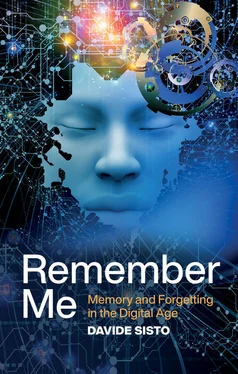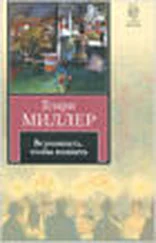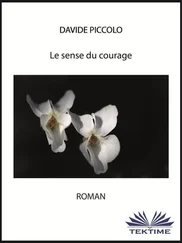The invention of the Memories section, according to Facebook’s product manager, Oren Hod, is justified by the fact that around ninety million people use On This Day each day, using the social network to relive experiences that are long gone, and therefore revive their own past. As a consequence, the creation of Memories provides all users with a dedicated place for their personal memories that allows them to consult these easily and intuitively without having to scroll through the hundreds or thousands of posts shared over the years. It would seem, then, that as far as ninety million people are concerned, it is not enough simply to tell the story of their past to themselves.
These numbers allow us to predict that Facebook in a not-too-distant future will create its own universal database of memories, which could be consulted using a simple single-word search. In this way Facebook will make definitive use of key word indexing (introduced in 2013) with a view to analysing our shared posts, looking for correlations, recurrent themes and anomalies in the lives recorded within it. Despite the inherent difficulty posed by managing such a vast level of content, this prediction is corroborated by the presence of a system that allows every user to make single searches by year, month and day within their own profile and those of their contacts. All they need to do is head to the ‘Activity Log’ section and select the year and month of interest, highlighting the shared posts, images and links to be recovered. In addition to this there is a ‘Stories’ archive that is easy to search and that can be downloaded onto the user’s computer. The ‘Stories’, used by both Facebook and Instagram, initially seem to prove Samantha right. They are, indeed, temporary ways of sharing photographs, videos and written texts. They stay visible for 24 hours after which time they delete themselves, just as happens with Snapchat content. Their objective is the creation of a kind of live streaming of our very existence, meaning immediacy, instantaneousness and the avoidance of recording are their fundamental prerogatives. However, the collective desire to preserve them and revive them whenever we wish has pushed those in charge at Facebook and Instagram to create a specific space that overwhelmingly downsizes the carpe diem inherent in these platforms.
Facebook even allows users to download the entirety of the digital life they have lived within its labyrinthine workings. If you visit the profile section on information, accessed from the general Settings page, you find a way of archiving all that content on your own computer: posts, photos, video, likes and reaction, friends, stories, messages, groups and so on. The download can include both single publications, once the type of information and desired timeframe have been selected, and the entire collection of documents. It is possible to choose between a HTML format, which is easier to view, and the JSON format that allows for another service to import the data immediately. This download, which involves a substantial amount of time for those profiles that have been particularly active over the years, is password-protected and only the account user is able to access it. It also only exists for a limited amount of time before it is automatically deleted. Alternatively, in the case of the user’s death (though only if they have previously given permission) this can be accessed by a legacy contact. Once the friend’s death has been certified, the legacy contact can carry out the download and archive a copy of the deceased’s profile and all its contents (excluding private messages) on their own computer. Thus, the digital memory carefully constructed by the deceased during their time on Zuckerberg’s social network will be preserved forever.
From the video celebrating the year that is about to end, to impromptu hashtags such as #10YearChallenge, to On This Day and Memories, arriving at the copy in a single file of all of your digital memories produced on Facebook over the years, Zuckerberg seems to make his own, albeit optimistically, the unnerving thought expressed by Mark Fisher: ‘in conditions of digital recall loss is itself lost’. 17Thanks to digital technology, the recollections buried in our memory today have the possibility of being disinterred at any moment in our daily life and brought back to life , once more achieving that same actuality that had characterized them when they had first been experienced.
This book, developing the reflections on Digital Death made in Online Afterlives , aims to analyse the philosophical consequences of this digital unearthing of memories for our way of remembering and forgetting, shining a light on the parallel effects of the past’s gradual emancipation from control by the present. In order to do this, it is necessary first to revisit those fundamental stages in the journey that has led, in less than twenty years, to the metamorphosis of social networks such as Facebook into technological memory chests and digital archives.
1 1 Jonathan Gottschall, The Storytelling Animal: How Stories Make Us Human, Houghton Mifflin Harcourt, New York 2012, p. 169.
2 2 Aleida Assmann, Sette modi di dimenticare [Seven Ways of Forgetting], Il Mulino, Bologna 2019, p. 23.
3 3 Antonella Tarpino, Geografie della memoria. Case, rovine, oggetti quotidiani, [Geographies of Memory. Houses, Ruins, Daily Objects] Einaudi, Turin 2008, p. 27.
4 4 Umberto Eco, La memoria vegetale e altri scritti di bibliofilia [The Vegetal Memory and Other Writings on Bibliophilia], La Nave di Teseo, Milan 2018, pp. 9–10.
5 5 Thomas Hobbes, De corpore, in Human Nature and De Corpore Politico, ed. J.C.A. Gaskin, Oxford University Press 2008, p. 220: ‘In memory, the phantasms we consider are as they were if worn out by time; but in our fancy we consider them as they are […] The perpetual arising of phantasms, both in sense and imagination, is that which we commonly call discourse of the mind, and is common to with other living creations. For he that thinketh notice of their likeness or unlikeness to one another.’
6 6 Bertolt Brecht, In Praise of Forgetting, in The Collected Poems of Bertolt Brecht, trans. and ed. David Constantine and Tom Kuhn, W.W. Norton and Company, London 2018, p. 646.
7 7 Walter Benjamin, ‘Paris, Capital of the Nineteenth Century’, in Reflections, trans. Edmund Jephcott, Schocken Books, New York 1986, pp. 155–6.
8 8 Kevin Kelly, The Inevitable. Understanding the 12 Technological Forces That Will Shape Our Future, Penguin, New York 2017, p. 61.
9 9 See Elias Canetti, Il libro contro la morte [The Book Against Death], Adelphi, Milan 2017, p. 49. For the German original, Das Buch gegen den Tod, Hanser Literaturverlage.
10 10 Within the concept of Digital Death we find the various ways in which digital technology is changing our connection to death, mourning and immortality. For more on this, see my book Online Afterlives. Immortality, Memory and Grief in Digital Culture, MIT Press 2020.
11 11 Elaine Kasket, All the Ghosts in the Machine. Illusions of Immortality in the Digital Age, Robinson, London 2019.
12 12 Kenneth Goldsmith, Wasting Time on the Internet, HarperCollins, New York 2016, p. 99.
13 13 Aleida Assmann, Sette modi di dimenticare [Seven Ways of Forgetting], op. cit., p. 52.
14 14 Vilem Flusser, Kommunikologie weiter denken. Die Bochumer Vorlesungen, Fisher Verlag, Frankfurt am Main 1998, p. 251. See also Byung-Chul Han, The Expulsion of the Other: Society, Perception and Communication Today, trans. Wieland Hoban, Polity, Cambridge 2018, p. 5.
15 15 J.J. Bachofen, Lebensrückschau, in H.G. Kippenberg (ed.), Mutterrecht und Urreligion, Stuttgart 1984, p. 11.
Читать дальше












